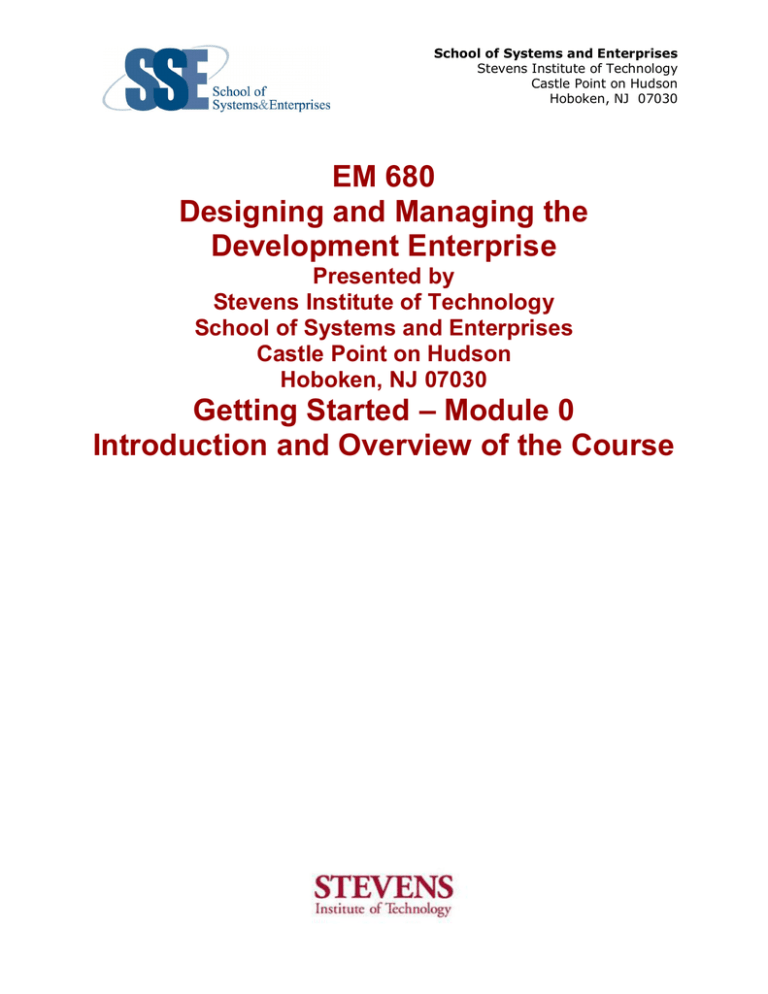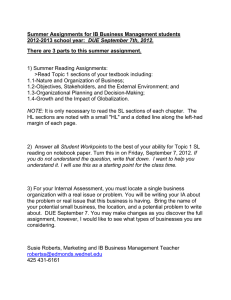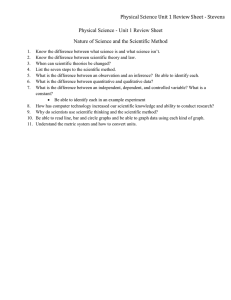EM 680 Designing and Managing the Development Enterprise
advertisement

School of Systems and Enterprises Stevens Institute of Technology Castle Point on Hudson Hoboken, NJ 07030 EM 680 Designing and Managing the Development Enterprise Presented by Stevens Institute of Technology School of Systems and Enterprises Castle Point on Hudson Hoboken, NJ 07030 Getting Started – Module 0 Introduction and Overview of the Course School of Systems and Enterprises Stevens Institute of Technology Castle Point on Hudson Hoboken, NJ 07030 Getting Started – Module 0 0.1. Welcome to EM 680: Designing and Managing the Development Enterprise This course introduces the attributes associated with the design and management of the human activity system that is responsible for designing, developing, testing, operating, and maintaining the system. It is built on a fundamental that the successful development of a system is directly contingent on the human system. Using foundational constructs related to network theory and the extended enterprise, it covers topics in Globalization and the Extended Enterprise; Structure and Design of Organizations; Organizational Diversity; Leadership and Power; Personality, Attitude, and Values; Learning and Perception; Work Motivation; Group Behavior and Teamwork; Conflict and Politics; Managing Communication Process; Decision Making; and Organizational Change and Development. Case studies and academic research are used to provide a practical and advanced understanding of the subject. 0.2. Course Objectives Designing and Managing the Development Enterprise aims to: ! Build the organizational constructs both at the application level and strategic level for integrating the human activity system as part of the development system. ! Challenge the student to think of the human activity system as an integral part of the development system, and how this may impact the strategy, operation, and function of the system. 0.3. Course Outline EM 680 has been developed to introduce some of the human activity system attributes that engineers will encounter when working with the development of systems. The course content will include text, lecture notes, class discussion and activities, and assignments. “Until we are able to shape corporate life around human values, the context for work won’t bring out the best in human behavior, nor will it produce the kind of creativity that corporations recognize they need in order to innovate and grow.” Kathleen Gumbleton, Founder & CEO E-Strategic Research, Inc. School of Systems and Enterprises Stevens Institute of Technology Castle Point on Hudson Hoboken, NJ 07030 Fast Company Magazine, September 2005 0.4. Syllabus Module Subject Assignments/Projects 0 Course Administrative ! Course Expectations ! Term Schedule 1 Globalization and the Extended Enterprise ! Forces of Globalization ! The Globalization Experience ! International Participation ! Management Involvement in Globalization ! Ethics in Globalization ! Extended Enterprise 2 Structure and Design of Organizations ! Fundamental Elements of Organizational Structure ! Factors Affecting Organizational Structure ! Organizational Culture ! Person-Organization Fit ! Networks as Organizations Project #1 Overview Defining an Organizational Accident (due week 10) 3 Social Network Analysis ! Social Networks ! Social Network Analysis ! Introduction to AGNA Project #2 Overview How Work Really Gets Done in Your Organization (due one week from final class) 4 Organizational Diversity ! Defining Diversity ! Forces of Change ! Effectiveness and Roadblocks to Diversity ! Creating and Managing Diversity 5 Leadership and Power ! The Nature of Leadership ! Behavioral Theories of Leadership ! Contingency Theories of Leadership ! Transactional and Transformational Leadership ! Substitutes for Leadership ! Global Differences in Leadership 6 School of Systems and Enterprises Stevens Institute of Technology Castle Point on Hudson Hoboken, NJ 07030 Personality, Attitudes, and Values ! Fundamentals of Personality ! Attitudes ! Values 7 Learning and Perception ! Fundamental Learning Principles ! Advanced Learning Concepts ! Perception 8 Work Motivation ! What is Motivation ! Content Theories of Motivation ! Process Theories of Motivation ! Integration of Motivation Theories 9 Group Behavior and Teamwork ! Nature of Groups and Teams ! Team Effectiveness ! Factors Affecting Team Effectiveness ! Team Development ! Managing for Effective Teams Conflict and Politics ! Nature of Conflict ! Causes of Conflict ! Conflict Escalation and Outcomes ! Responses to Conflict ! Organizational Application of Conflict Resolution Techniques ! Power ! Organizational Politics 10 Project #1 Defining an Organizational Accident Team Presentations: Project #1 DUE 11 Managing Communication Processes ! The Communication Process ! Communication with Organizations ! Interpersonal Communication ! Barriers to Effective Communication ! Overcoming Barriers to Communication 12 Decision Making ! Fundamental of Decision Making ! Individual Decision Making ! Group Decision Making ! Who Should Decide? Ind. vs. Group 13 Organizational Change and Development School of Systems and Enterprises Stevens Institute of Technology Castle Point on Hudson Hoboken, NJ 07030 ! ! ! Pressures for Organizational Change Planned Change Organizational Development 0.5. Assignments EM 680 employs project teams to facilitate the learning process. Each team consists of three students who work on team assignments throughout the semester. As indicated above, the course is divided into thirteen weeks. Each lecture includes lecture notes and other resource materials, which students use to complete the assignments. Teams submit their completed assignments at the next class of the week they were assigned and the projects when specified. The process for completing team assignments is as follows: a. Individual students review the lecture notes and resource material provided in the classroom and online. b. Project teams discuss the material and complete the assignment as a team as specified. c. The instructor reviews the posted work and provides comments and feedback. 0.6. Lecture Notes and Text Students will notice that lecture notes have been prepared from presentation slides used to teach the course in a traditional face-to-face classroom. Slides are titled to follow the syllabus with descriptive subtopics. Reviewing the material with other members of their team, applying it in the team assignments, participating in the discussion, and reviewing the text all play a role in developing an understanding. Students are encouraged to rely on the entire process rather than struggle to understand a particular point that may seem unclear in the slides. TEXTS/BOOKS: ! Cross, R.L. and A. Parker. (2004). The Hidden Power of Social Networks: Understanding How Work Really Gets Done in Organizations. Harvard Business School. ISBN: 1591392705 ! Reason, J. (1997). Managing the Risks of Organizational Accidents. Burlington, VT: Ashgate. ISBN: 1840141050 0.7. Team Leadership Effective time management is crucial to ensure that teams complete their assignments on time and to keep the course on schedule for all participants. To facilitate this, team leaders are to be assigned for each team assignment and can be assigned on a rotating basis. The team leader for each assignment is responsible for: a) arranging the team meeting or meetings, b) facilitating the team discussion and ensuring the full participation of each member of the team, c) verifying that the team’s response to the assignment is accurate and complete, and d) posting the assignment in the appropriate discussion area by midnight School of Systems and Enterprises Stevens Institute of Technology Castle Point on Hudson Hoboken, NJ 07030 Thursday. 0.8. Assignments: Discussions and Projects Assignment Task Due Discussions; Essays Participate in weekly discussions and perspective essays (individual) Due during the two weeks from the class they were assigned. Project #1 Defining an Organizational Accident; presentation; requirements available online (team) Due week 10. Project #2 How Work Really Gets Done in Your Organization: written; requirements available online (team) Due one week after the last class via email, no later than 4:00pm. Failure to submit all required materials by their due dates will result in a failing grade for the class. Under some conditions, extensions will be allowed beyond the deadline. A written/email request must be made before the time the assignment is due, and the instructor has full authority to grant or deny any request 0.9. Criteria for Course Completion In order to successfully complete the course, each student must: a) Complete a student profile at the beginning of the course. b) Ensure that assignments are submitted on time for which they are assigned. c) Participate in the class discussions. d) Contribute to the team projects. e) Complete the evaluation form at the end of the course 0.10. Grading Graded Events Total Points Discussions 150 Project #1 – Reason 150 Project #2 – SNA 200 Course Total 500 GRADING AND CRITERIA FOR PASSING: (1) Turn in all written material (see Lesson Schedule). (2) Final grades will be awarded in accordance with the following scale: Grade Percentage A 90 – 100 B 80 – 89 C 70 – 79 School of Systems and Enterprises Stevens Institute of Technology Castle Point on Hudson Hoboken, NJ 07030 F <70




